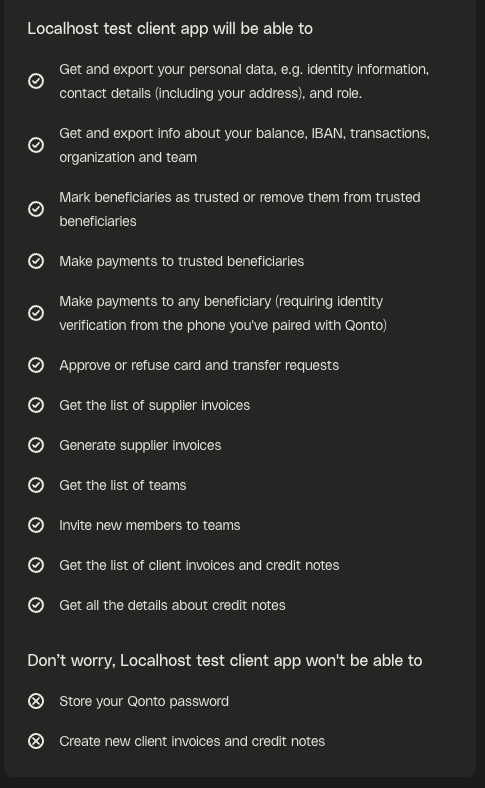Context
These operations are available through multiple platforms and third-party-integrations maintained by Qonto SA for the sake of their customers:- Web application available at https://app.qonto.com
- Android and iOS applications available respectively in the Play and Apple stores.
- PSD2-compatible API available at https://thirdparty.qonto.com
Multi-factor authentication
Clients are required to choose a password that respects the following constraints:- 9 characters minimum
- Complex enough to pass an algorithmic strength test
Web application firewall
All of Qonto’s public endpoints are protected behind a Web Application Firewall (WAF), that provides the following security measures:- Rejection of malicious requests
- Blockage of requests exploiting Web application vulnerabilities
- Blockage of requests issued from suspicious IP addresses
- DDOS protection
Encryption and data confidentiality
Communication between customers and the Qonto application are encrypted using publicly trusted TLS certificates supporting strong encryption and hashing algorithms.Server and application hardening
We automatically update all of our software, packages and servers to guarantee the security of the components running the Qonto application. Servers are configured to only contain the packages required to run our applications therefore minimising the attack surface. We follow all the hardening guidelines provided by the international standards such as NIST 800-123.Security assessments
Every code change submitted to the Qonto application is scanned for vulnerabilities and malicious packages. The code is also submitted a human review and must pass non-regression tests before deployment. Qonto calls on a specialised third party auditor to perform annual security assessment. The result of this assessment is shared with the Executive team.Backup and resiliency
Customer data is backed up in AWS S3 along with the guarantees that this service provides in terms of durability. The Qonto application is actively running in three AWS datacenters around the Paris region insuring that no single point of failure could impact our quality of service. We perform an annual business continuity plan where we simulate in real conditions the failure of a critical component and stress test our technical mitigations and process.Qonto’s internal security
On top of the protections mentioned above, Qonto employs many more security measures to protect the infrastructure against various threats:- Phishing-resistant multi-factor authentication (WebAuthn) is mandatory for all employees
- Fine-grained access control coupled with the least privilege principle
- Detection of suspicious behaviour covering all our critical tools
- An infrastructure described as code to easily identify all assets
- Ephemeral access
- Encryption of all datastores
Security certifications
As a payment institution authorised and supervised by the ACPR, Qonto is subject to many regulatory requirements mandating strong security commitments:- DIRECTIVE (EU) 2015/2366 on Payment Services (DSP2)
- EBA Guidelines on ICT and Security Risk Management
- “arrêté du 3 novembre 2014” as well as the IT risk notice ACPR
- Digital Operational Resilience Act
- Compliance with PCI-DSS requirements
Third party access through the open banking API
In compliance with PSD2 requirements, Qonto is mandated to provide an open banking interface to licensed entities (aggregators, accounting software, and so on). Customers can access their Qonto data through licenced payment services providers thanks to the integration of this interface. Each partner may request one or several scopes to make their integration work: access to the balance, transactions, attachments and so on. Their detailed permissions are presented to the customer upon installation of the integration. See the screen below for an example: